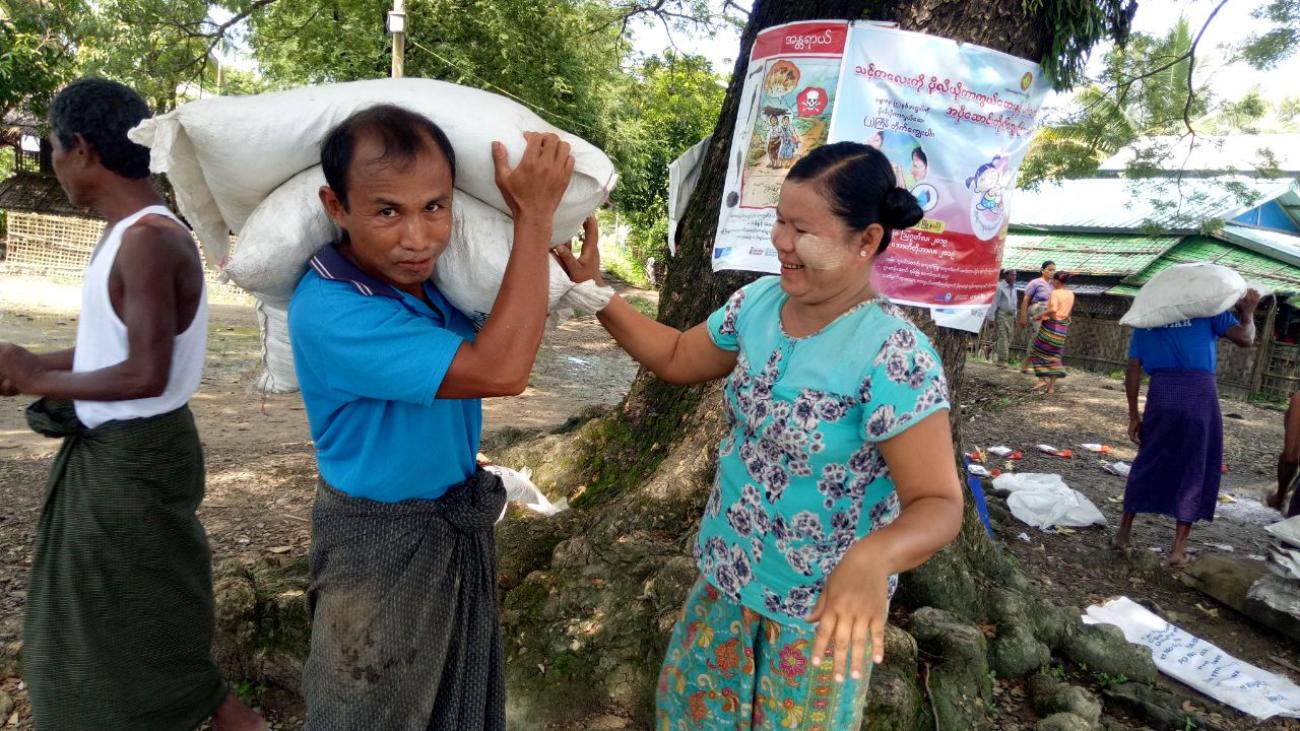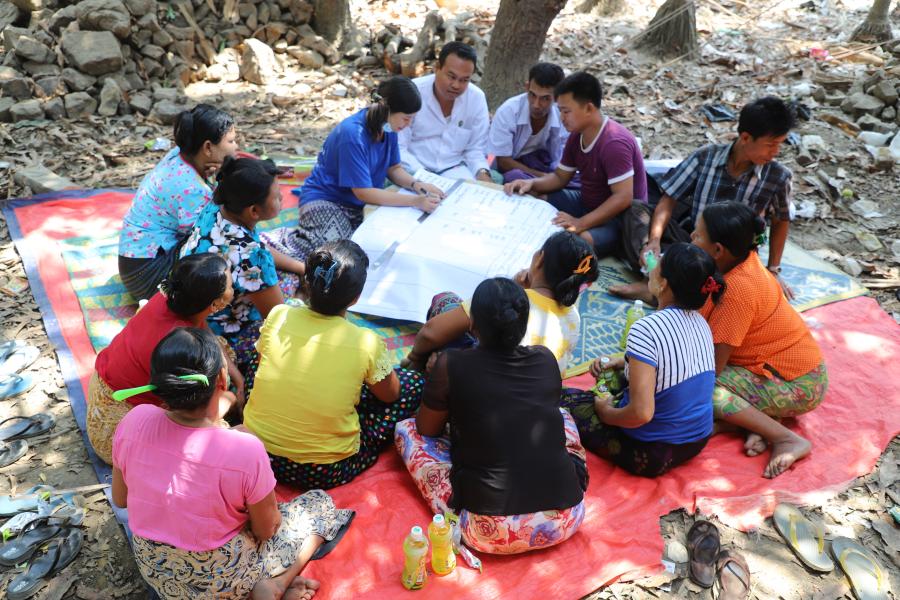United Nations in Myanmar is working to address food and nutrition security impacts in times of COVID-19

The UN in Myanmar has come together as one to support COVID-19 preparedness and response. The next in a series of articles highlights the FAO's contribution.
The UN Secretary-General Antonio Guterres has said that ending the pandemic everywhere is both a moral imperative and a matter of enlightened self-interest. Extraordinary times demand extraordinary measures. We face a colossal test which demands decisive, coordinated and innovative action from all, for all. In Myanmar, the UN has come together as one to support COVID-19 preparedness and response. In these series of articles outlining the work of the UN Country Team, FAO highlights the work being done to address food and nutrition security impacts in times of COVID-19.
Seven out of ten people in Myanmar’s rural areas rely on farming or fishing to make a living. And with various restrictions in place, especially those that limit movement, to contain the spread of COVID-19, many poor and vulnerable people, already burdened by their meagre resources, are facing pressure in terms of household food security, income sources, livelihoods and purchasing power.
Here is how we are responding
The Food and Agriculture Organization of the United Nations (FAO) has been conducting regular rapid assessments from 120 fishing and aquaculture communities in Yangon and Ayeyarwaddy regions as well as in Rakhine state. The findings indicate that many people complain about the drop in prices, lack of access to regular markets, loss of employment as well as scarcity of food, hygiene items and medicine.
“We are adapting to the changes caused by COVID-19. Many people are looking for income from other sources, like gardening and supporting community awareness organized by the village administration. We are taking care of ourselves, our family, and the community” said U Mya Soe Min, one of the representatives from Kyee Chaung Village in Ayeyarwaddy Region.
Also, from the Central Dry Zone (CDZ), Chin and Delta region, the assessment has shown the challenges farmers face in three different agroecological zones and actions taken in the context of the current COVID-19 response measures in force. The findings of the assessment will inform ongoing UN activities so they are adjusted to support seed distribution, microfinance, home gardening, value chain and guidance on agriculture, livestock and fisheries practices.
“With travel restrictions in place to stop the spread of COVID-19, we have made adjustments to our ways of working. For this exercise, we carried out phone interviews with about 200 farmers. These exchanges give us first-hand views of what people are experiencing during this outbreak” said Xavier Bouan, FAO Senior Technical Advisor.
“There is no doubt that understanding the impact of COVID-19 on people’s lives, monitoring and building early warning signals, including identifying potential hot spots, is vital for the United Nations and its partners,” says the FAO Representative in Myanmar, Xiaojie Fan.
Meanwhile, FAO, in collaboration with the World Food Programme, has started to assess food security and changes in livelihood opportunities due to COVID-19 and its impact on food production and agriculture supplies and prices with communities in Yangon, Chin, Kayin, Mon, Shan, Kachin and Rakhine States.
Through the European Union Food and Nutrition Security Impact, Resilience, Sustainability and Transformation programme (FIRST), FAO is encouraging policymakers, government departments, and the private sector to work together to ensure that food supply chains are not disrupted locally and internationally.
Additionally, together with the state agriculture authorities, FAO will go through a review exercise of 6,000 vulnerable households in Buthidaung, Kyauktaw, Maungdaw, and Rathedaung townships for upcoming activities in Rakhine State. Families will receive COVID-19 hygiene kits and benefit from social behavior change communication activities to improve hygiene practices. They will also receive seeds, fertilizers, mechanization inputs, and agriculture production guidance for the monsoon planting season. Additionally, households will receive unconditional cash transfers to top up existing government social protection schemes targeting the most vulnerable, pregnant, and lactating women.
Building blocks
Programmes were already in progress, long before Myanmar confirmed its first COVID-19 case in March. For example, with support from the EU, FAO provided 4,500 farmers with quality planting material and agro-processing machines. It also advised farmers on good agriculture and nutrition practices.
Most recently, to improve the detection, prevention and control of transboundary animal diseases (TAD), FAO provided novel technology in the form of the portable polymerase chain reaction (PCR) diagnostic system equipment and reagents that enables an accurate diagnosis of African Swine Fever (ASF) away from the laboratory. The introduction of the portable PCR will contribute towards controlling the spread of ASF, as new technology now allows for quick diagnosis within an hour instead of four hours by the real-time PCR method.
In the area of food and nutrition security, COVID-19 public awareness and social behavior communication change activities will be implemented together with efforts to address barriers to improving nutrition in the Central Dry Zone regions. These are the regions that show low income, limited knowledge of optimal nutrition practices, less focus on nutrition-sensitive agriculture, and limited time availability for preparation of diverse nutritious foods are in progress under the Global Agriculture and Food Security Programme (GAFSP).
In coastal and inland small fisheries and aquaculture communities, FAO is supporting the villagers on understanding their own livelihoods and climate related vulnerabilities. Further, FAO is training these communities to develop and implement integrated natural resources management plans to bridge the existing gaps in vulnerabilities and thus, increasing their resilience.
“With the current COVID-19 pandemic, humanitarian and development efforts are critical to helping us avoid reversing hard-won development gains, and poverty reduction” stressed Xiaojie Fan.
"We remain committed to offering our technical support to the government in the development of coherent and evidence-based policies and programs to mitigate the risks of the pandemic on food security and nutrition and support the country to be more resilient to future shocks and stresses.”.




